Raghuram Ramanujan
Forward versus Backward: Comparing Reasoning Objectives in Direct Preference Optimization
Jan 12, 2026Abstract:Large language models exhibit impressive reasoning capabilities yet frequently generate plausible but incorrect solutions, a phenomenon commonly termed hallucination. This paper investigates the effect of training objective composition on reasoning reliability through Direct Preference Optimization. Two complementary training signals are examined: forward chain-of-thought generation, which trains the model to produce correct reasoning traces, and backward verification, which trains the model to verify and acknowledge errors in candidate solutions. Experiments on GSM8K reveal a fundamental trade-off between these objectives. Forward-only DPO training achieves the highest accuracy improvement, increasing from 83.1% to 86.6% (+3.5 percentage points), while backward-only training yields minimal accuracy gains but substantially reduces the false positive rate from 13.4% to 4.3%. Notably, both training variants reduce acknowledgement rate compared to the baseline, suggesting that preference optimization increases model confidence in its outputs. These findings indicate that forward and backward reasoning objectives provide distinct and complementary learning signals: forward training improves problem-solving capability, while backward training improves verification calibration. The complete training and evaluation pipeline, implemented efficiently through Low-Rank Adaptation, is released to facilitate further research.
Sparse Methods for Vector Embeddings of TPC Data
Nov 14, 2025Abstract:Time Projection Chambers (TPCs) are versatile detectors that reconstruct charged-particle tracks in an ionizing medium, enabling sensitive measurements across a wide range of nuclear physics experiments. We explore sparse convolutional networks for representation learning on TPC data, finding that a sparse ResNet architecture, even with randomly set weights, provides useful structured vector embeddings of events. Pre-training this architecture on a simple physics-motivated binary classification task further improves the embedding quality. Using data from the GAseous Detector with GErmanium Tagging (GADGET) II TPC, a detector optimized for measuring low-energy $β$-delayed particle decays, we represent raw pad-level signals as sparse tensors, train Minkowski Engine ResNet models, and probe the resulting event-level embeddings which reveal rich event structure. As a cross-detector test, we embed data from the Active-Target TPC (AT-TPC) -- a detector designed for nuclear reaction studies in inverse kinematics -- using the same encoder. We find that even an untrained sparse ResNet model provides useful embeddings of AT-TPC data, and we observe improvements when the model is trained on GADGET data. Together, these results highlight the potential of sparse convolutional techniques as a general tool for representation learning in diverse TPC experiments.
Unpaired Translation of Point Clouds for Modeling Detector Response
Jan 30, 2025



Abstract:Modeling detector response is a key challenge in time projection chambers. We cast this problem as an unpaired point cloud translation task, between data collected from simulations and from experimental runs. Effective translation can assist with both noise rejection and the construction of high-fidelity simulators. Building on recent work in diffusion probabilistic models, we present a novel framework for performing this mapping. We demonstrate the success of our approach in both synthetic domains and in data sourced from the Active-Target Time Projection Chamber.
Lightweight Online Learning for Sets of Related Problems in Automated Reasoning
May 22, 2023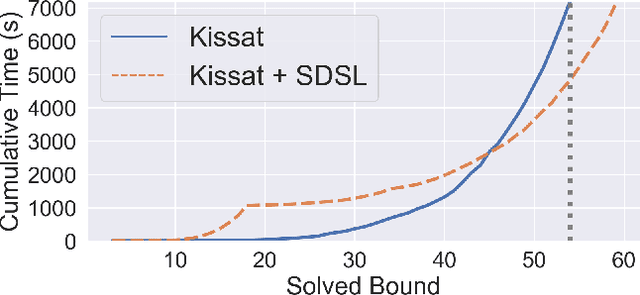
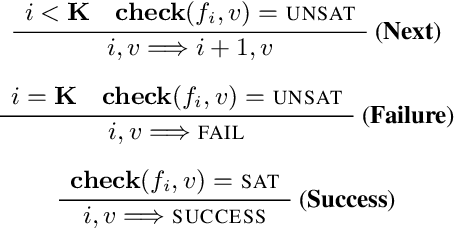
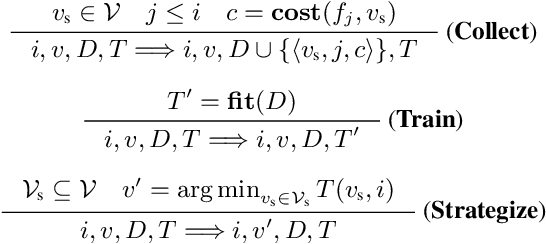
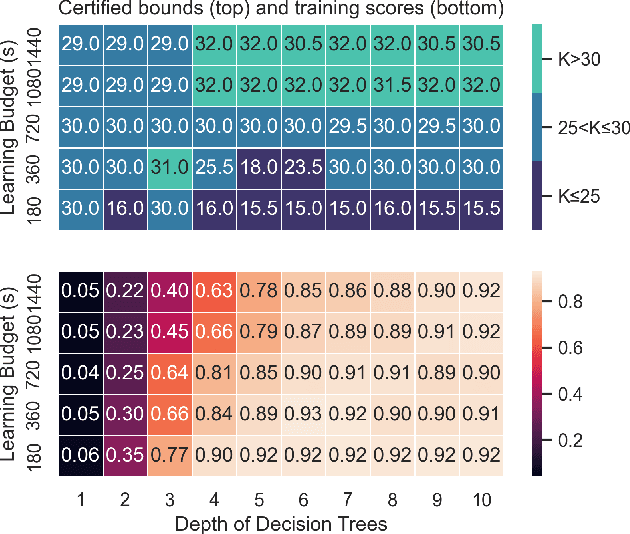
Abstract:We present Self-Driven Strategy Learning ($\textit{sdsl}$), a lightweight online learning methodology for automated reasoning tasks that involve solving a set of related problems. $\textit{sdsl}$ does not require offline training, but instead automatically constructs a dataset while solving earlier problems. It fits a machine learning model to this data which is then used to adjust the solving strategy for later problems. We formally define the approach as a set of abstract transition rules. We describe a concrete instance of the sdsl calculus which uses conditional sampling for generating data and random forests as the underlying machine learning model. We implement the approach on top of the Kissat solver and show that the combination of Kissat+$\textit{sdsl}$ certifies larger bounds and finds more counter-examples than other state-of-the-art bounded model checking approaches on benchmarks obtained from the latest Hardware Model Checking Competition.
Lookahead Pathology in Monte-Carlo Tree Search
Dec 10, 2022



Abstract:Monte-Carlo Tree Search (MCTS) is an adversarial search paradigm that first found prominence with its success in the domain of computer Go. Early theoretical work established the game-theoretic soundness and convergence bounds for Upper Confidence bounds applied to Trees (UCT), the most popular instantiation of MCTS; however, there remain notable gaps in our understanding of how UCT behaves in practice. In this work, we address one such gap by considering the question of whether UCT can exhibit lookahead pathology -- a paradoxical phenomenon first observed in Minimax search where greater search effort leads to worse decision-making. We introduce a novel family of synthetic games that offer rich modeling possibilities while remaining amenable to mathematical analysis. Our theoretical and experimental results suggest that UCT is indeed susceptible to pathological behavior in a range of games drawn from this family.
Implicit Quantile Neural Networks for Jet Simulation and Correction
Nov 22, 2021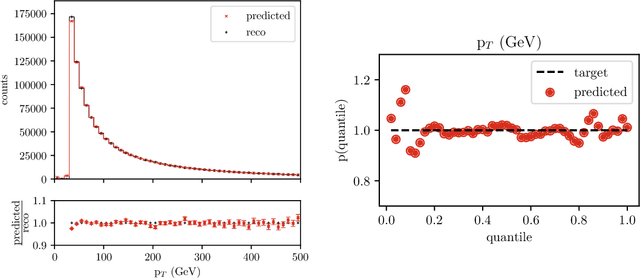
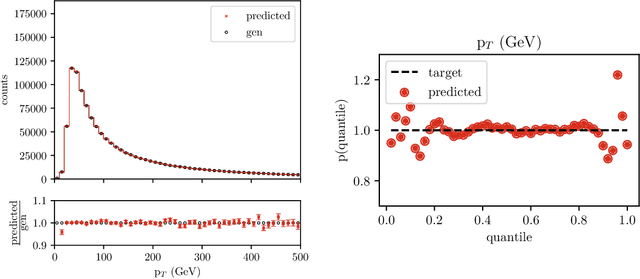
Abstract:Reliable modeling of conditional densities is important for quantitative scientific fields such as particle physics. In domains outside physics, implicit quantile neural networks (IQN) have been shown to provide accurate models of conditional densities. We present a successful application of IQNs to jet simulation and correction using the tools and simulated data from the Compact Muon Solenoid (CMS) Open Data portal.
G2SAT: Learning to Generate SAT Formulas
Oct 29, 2019



Abstract:The Boolean Satisfiability (SAT) problem is the canonical NP-complete problem and is fundamental to computer science, with a wide array of applications in planning, verification, and theorem proving. Developing and evaluating practical SAT solvers relies on extensive empirical testing on a set of real-world benchmark formulas. However, the availability of such real-world SAT formulas is limited. While these benchmark formulas can be augmented with synthetically generated ones, existing approaches for doing so are heavily hand-crafted and fail to simultaneously capture a wide range of characteristics exhibited by real-world SAT instances. In this work, we present G2SAT, the first deep generative framework that learns to generate SAT formulas from a given set of input formulas. Our key insight is that SAT formulas can be transformed into latent bipartite graph representations which we model using a specialized deep generative neural network. We show that G2SAT can generate SAT formulas that closely resemble given real-world SAT instances, as measured by both graph metrics and SAT solver behavior. Further, we show that our synthetic SAT formulas could be used to improve SAT solver performance on real-world benchmarks, which opens up new opportunities for the continued development of SAT solvers and a deeper understanding of their performance.
Machine Learning Methods for Track Classification in the AT-TPC
Oct 21, 2018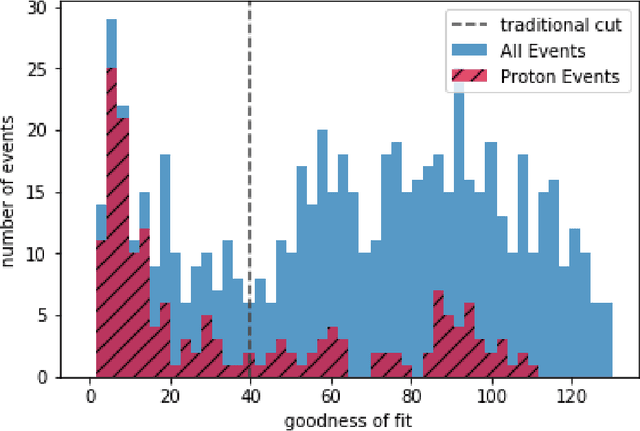

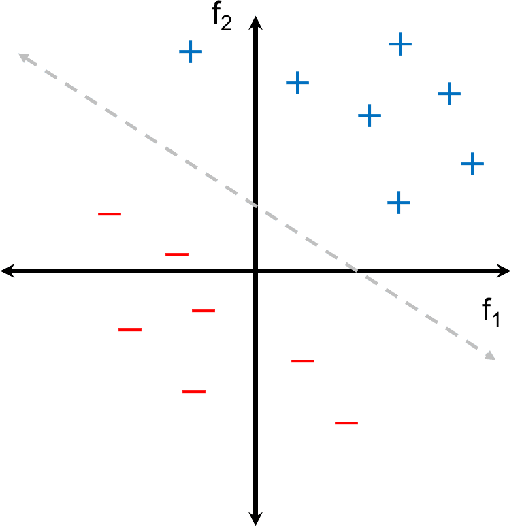

Abstract:We evaluate machine learning methods for event classification in the Active-Target Time Projection Chamber detector at the National Superconducting Cyclotron Laboratory (NSCL) at Michigan State University. An automated method to single out the desired reaction product would result in more accurate physics results as well as a faster analysis process. Binary and multi-class classification methods were tested on data produced by the $^{46}$Ar(p,p) experiment run at the NSCL in September 2015. We found a Convolutional Neural Network to be the most successful classifier of proton scattering events for transfer learning. Results from this investigation and recommendations for event classification in future experiments are presented.
Understanding Sampling Style Adversarial Search Methods
Mar 15, 2012



Abstract:UCT has recently emerged as an exciting new adversarial reasoning technique based on cleverly balancing exploration and exploitation in a Monte-Carlo sampling setting. It has been particularly successful in the game of Go but the reasons for its success are not well understood and attempts to replicate its success in other domains such as Chess have failed. We provide an in-depth analysis of the potential of UCT in domain-independent settings, in cases where heuristic values are available, and the effect of enhancing random playouts to more informed playouts between two weak minimax players. To provide further insights, we develop synthetic game tree instances and discuss interesting properties of UCT, both empirically and analytically.
 Add to Chrome
Add to Chrome Add to Firefox
Add to Firefox Add to Edge
Add to Edge